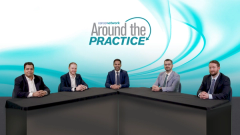
Opinion|Videos|March 3, 2025
Beyond Salvage: When to Move to CAR T in Relapsed DLBCL
Panelists discuss, when evaluating chimeric antigen receptor T-cell (CAR T) therapy for patients with relapsed/refractory diffuse large B-cell lymphoma (DLBCL), how key considerations include the patient’s fitness, disease burden, prior treatment response, and timing of referral. The limitations of traditional salvage therapy, with historically poor outcomes, must be weighed against CAR T’s potential for durable remissions despite its risks and complexities.
Advertisement
Episodes in this series

Video content above is prompted by the following:
- Given the outcomes of traditional salvage approaches, what factors influence your decision-making when considering CAR T therapy for patients with relapsed/refractory DLBCL?
Newsletter
Stay up to date on recent advances in the multidisciplinary approach to cancer.
Advertisement
Latest CME
Advertisement
Advertisement
Trending on CancerNetwork
1
Modifiable Risk Factors Suggest Potential for Improving Cancer Prevention
2
2026 Tandem Meetings: What’s the Latest Research in Multiple Myeloma?
3
Dato-DXd Receives Priority Review in Unresectable/Metastatic TNBC
4
Barriers to CAR T-Cell Referral and Center Access in Multiple Myeloma
5





































